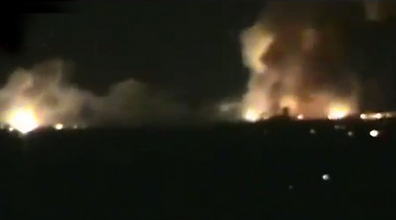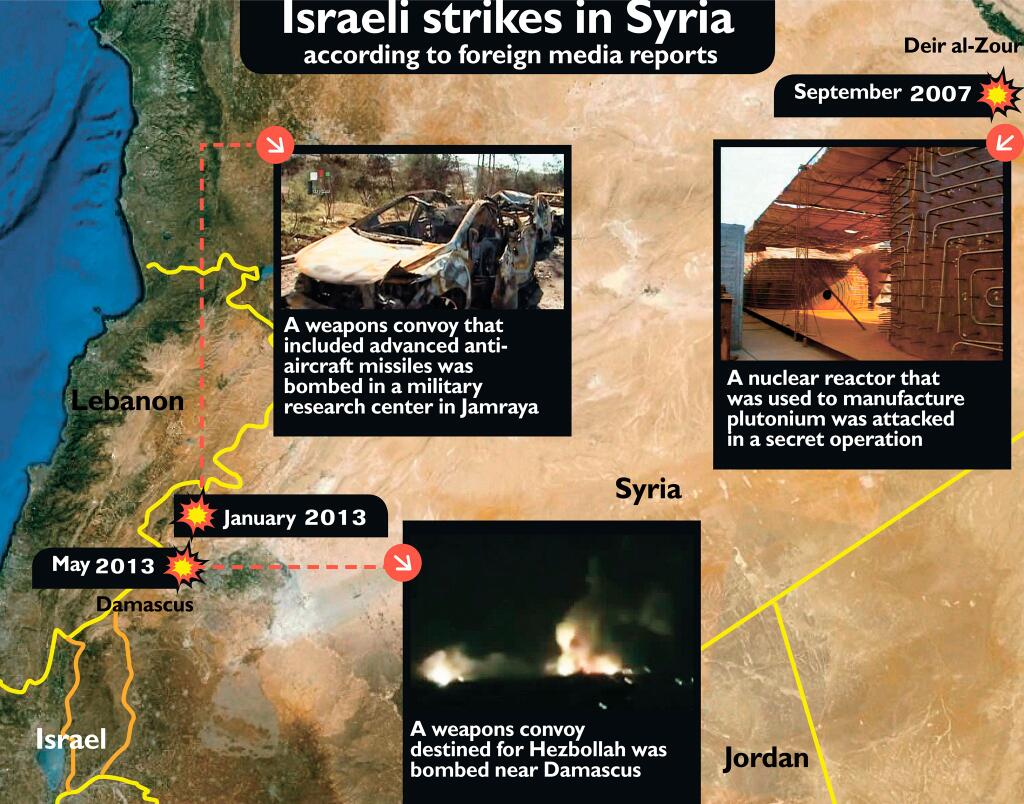
DEBKAfile Exclusive Analysis May 6, 2013, 12:05 PM (IDT)
 Israel’s two air force strikes on Syria in three days – the second targeting the emblems of Assad rule overlooking Damascus from Mt. Qassioun – appear to be part of a tactical plan put together by the US Israel, and two Sunni powers, Turkey and Qatar, to break up the Tehran-Damascus-Beirut radical bloc and eventually force Iran to give up its nuclear bomb aspirations.
Israel’s two air force strikes on Syria in three days – the second targeting the emblems of Assad rule overlooking Damascus from Mt. Qassioun – appear to be part of a tactical plan put together by the US Israel, and two Sunni powers, Turkey and Qatar, to break up the Tehran-Damascus-Beirut radical bloc and eventually force Iran to give up its nuclear bomb aspirations.This is how it will be interpreted by Supreme Leader Ayatollah Ali Khamenei, Bashar Assad and Hassan Nasrallah as they prepare their responses for the Israeli attacks.
Without officially confirming those strikes ever took place, Israel insisted that its air force and rockets singled out the advanced Iranian weapons waiting in Syria for transfer to Hizballah - and Hizballah itself. This message was designed for a purpose: It was meant to support Washington’s argument to Moscow that Israel had not aimed its bombs and rockets against Assad and his army – only the Iranian and Hizballah military presence in Syria.
But it didn’t quite work that way, because no one in Damascus slept a wink early Sunday, May 5, as Israel rocket blasts shook the city in what was described as a 4 magnitude earthquake and inflicted heavy casualties – not on the Hizballah brigades fighting in Syria, but Syrian elite units stationed around Mt. Qassioun.
But it didn’t quite work that way, because no one in Damascus slept a wink early Sunday, May 5, as Israel rocket blasts shook the city in what was described as a 4 magnitude earthquake and inflicted heavy casualties – not on the Hizballah brigades fighting in Syria, but Syrian elite units stationed around Mt. Qassioun.
The columns of fire over Damascus flashing across world screens caused the Assad regime and army serious loss of face.


Syrian officials could do no less then broadcast dire threats of war, but may be poised to do more.
Monday, May 6, the Syrian ruler spelled out his next plan of action in a message posted to Moscow: A third Israeli strike would incur an instantaneous Syrian response, he warned. Damascus would let Palestinian organizations off the leash to mount attacks against Israel from the Syrian Golan.
Monday, May 6, the Syrian ruler spelled out his next plan of action in a message posted to Moscow: A third Israeli strike would incur an instantaneous Syrian response, he warned. Damascus would let Palestinian organizations off the leash to mount attacks against Israel from the Syrian Golan.
What this presages, according to our military sources, is the launching of a cross-border war of attrition mounted from Syria and Lebanon by Syrian and Hizballah soldiers posing as Palestinian fighters.
That is if Israel continues its assaults on Syria.
That is if Israel continues its assaults on Syria.
Iran’s Foreign Ministry Spokesman Ramin Mehmanparast said Monday that Israel’s “acts of aggression against Syria will not go unanswered and Tel Aviv will receive a crushing response.”
Washington is meanwhile expected to follow up on the Israeli operation in Syria by the end of May, early June, with operations ranging from US arms supplies to the Syrian rebels to demolishing Syria’s air force facilities and missile sites by US air strikes from Turkey, Europe and Israel. Barak Obama used this tactic to overthrow Muammar Qaddafi in Libya two years ago.
Washington is meanwhile expected to follow up on the Israeli operation in Syria by the end of May, early June, with operations ranging from US arms supplies to the Syrian rebels to demolishing Syria’s air force facilities and missile sites by US air strikes from Turkey, Europe and Israel. Barak Obama used this tactic to overthrow Muammar Qaddafi in Libya two years ago.
The Obama administration made a point of getting these options into print in Monday’s media after saying in answer to a question about the Israeli air strikes: “Israel justifiably has to guard against advance weapons reaching Hizballah.”
DEBKAfile’s military sources: Since the Syrian rebels are being systematically ground down and falling apart under the crushing weight of the Syrian army backed by Iranian and Hizballah troops and Moscow, feeding the rebels more weapons may no longer avail. So this would be the less probable of the two options.
And meanwhile, Israel’s military operation has altered the military equation for Syria. And so President Barack Obama will again try to proposition Vladimir Putin for a joint effort to end the Syrian war. He would not be averse even to Russian forces landing in Syria to enforce the termination of hostilities.
The US president got nowhere with his past bids to break up the Iranian-Syrian-Hizballah front - mainly because he was outmaneuvered by Russia.
On April 27, before Israel embarked on action against Syria, Russian Deputy Foreign Minister Mikhail Bogdanov forged a new Russian alliance with Hizballah in Beirut. This was Putin’s answer to Obama’s direct appeal for a partnership in the effort to terminate the Syrian conflict.
Obama’s rejoinder was the green light he gave Israel to go for Iranian and Hizballah targets in Syria.
The claim by a “senior US intelligence official” that Israel did not apprise Washington before embarking on its Syrian operation does not hold water. The Netanyahu government might have embarked on a “justifiable” operation against advanced Iranian arms for Hizballah on its own, but would not have stuck its neck out to strike Syria’s elite troops on Mt. Qassioun without first clearing it with the Obama administration.
But the new direction now indicated may derail Washington’s plan for a superpower deal to bring the horrendous Syrian crisis to a close. The local players, Khamenei, Assad and Nasrallah, are getting ready to grab the wheel and push the US and Israel off the driving seat.
Assad warned Moscow Monday of his plan for a war of attrition against Israel, using Palestinian fighters as cutouts, while Iran, Syria and Hizballah turned their missile batteries around to face Israel.
Having taken the calculated risk that Syria would be too busy with its own war to embark on a major reprisal, Israel Sunday night placed the country’s northern borders and region, including the big port town of Haifa - and its early warning systems - on the highest level of war alert, closed its northern airspace to civilian traffic for a couple of days, stationed Iron Dome anti-missile batteries at vulnerable points, and advised local authorities to go on standby.
All the parties concerned, from Washington and Moscow, to Jerusalem, Tehran, Damascus and Beirut, were waiting Monday on tenterhooks to see who made the next move.


Israel bombs missile shipment in Syria








Israel's IAF
